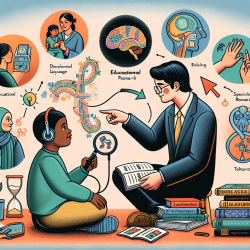Introduction
In the realm of healthcare, particularly in low- and middle-income countries, the integration of mental health services into existing healthcare frameworks remains a significant challenge. The CobALT (Collaborative care for the detection and management of depression among adults receiving antiretroviral therapy) trial offers a promising approach to addressing this challenge, particularly among adults on antiretroviral therapy (ART) in South Africa. This blog explores how practitioners can leverage the findings from this trial to enhance their practice and improve patient outcomes.
The CobALT Trial: An Overview
The CobALT trial is a pragmatic, cluster-randomized controlled trial conducted across 40 clinics in South Africa's North West Province. It aims to assess the effectiveness and cost-effectiveness of a collaborative care model for managing depression among adults on ART. The trial involves training healthcare providers in mental health components and clinical communication skills, introducing clinic-based behavioral health counselors, and strengthening referral pathways for depression treatment.
Key Findings and Implications for Practice
The CobALT trial's preliminary findings suggest that integrating mental health services into ART programs can significantly improve both mental and physical health outcomes. Here are some key takeaways for practitioners:
- Collaborative Care Model: The trial emphasizes a nurse-led collaborative care model that includes training in mental health and communication skills. Practitioners can adopt similar models to enhance the detection and management of depression in ART patients.
- Behavioral Health Counselors: The introduction of clinic-based counselors to provide manualized depression counseling has shown promise. Practitioners should advocate for the inclusion of such roles within their healthcare settings to address mental health needs effectively.
- Referral Pathways: Strengthening referral pathways for mental health services is crucial. Practitioners should work towards creating robust referral systems to ensure patients receive comprehensive care.
Encouraging Further Research
While the CobALT trial provides valuable insights, there is a need for further research to refine and expand upon these findings. Practitioners are encouraged to explore the following areas:
- Long-term Outcomes: Investigate the long-term impact of integrated mental health services on ART adherence and overall health outcomes.
- Cost-Effectiveness: Conduct cost-effectiveness analyses to determine the financial viability of scaling up collaborative care models in different settings.
- Cultural Adaptation: Explore how cultural factors influence the implementation and effectiveness of mental health interventions in diverse populations.
Conclusion
The CobALT trial highlights the potential benefits of integrating mental health services into ART programs. By adopting a collaborative care approach, practitioners can improve patient outcomes and address the mental health treatment gap in resource-constrained settings. To further explore the findings of the CobALT trial, practitioners are encouraged to read the original research paper: Collaborative care for the detection and management of depression among adults receiving antiretroviral therapy in South Africa: study protocol for the CobALT randomised controlled trial.










